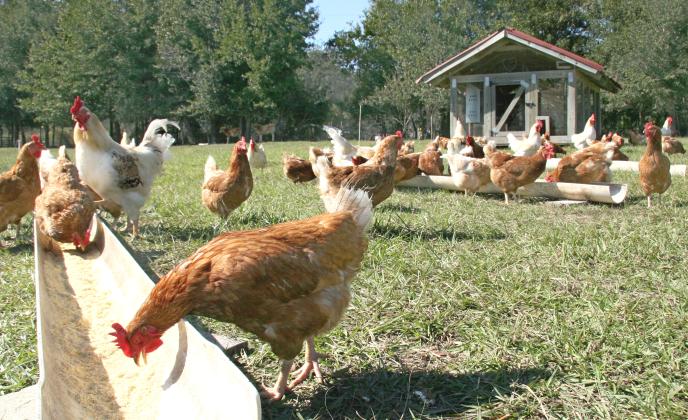Backyard poultry flocks have become more common in recent years, and small flock owners should be aware of how to prevent illness in their flocks and what to do if birds become sick or die.
Avian influenza: The first detection of the highly pathogenic occurred recently in a backyard poultry flock in Central Florida. While this incident was presumed contained without any expected threat to agriculture or human health, it serves as a reminder to bird owners to pay attention to the health of their birds.
Avian influenza is a virus that can affect many species of domesticated and wild birds, including chickens, turkeys, quail, ducks, guinea fowl, peafowl, and seagulls. Some birds infected with the virus do not show symptoms, while some birds become ill or die from the virus.
Avian influenza is classified as low pathogenic or highly pathogenic. Within each of these types, there are many strains of avian flu virus. Some highly pathogenic strains evolve from milder strains. The avian influenza virus can quickly mutate when it spreads from chicken to chicken.
Highly pathogenic avian flu spreads very quickly and the current nationwide outbreak is having devastating impacts on the commercial poultry industry. Over 40 million domesticated birds have been affected by highly pathogenic avian flu this year, poultry quarantine areas have been put in place in some locations, and international trade bans have occurred. The virus continues to spread throughout the Country.
Backyard chicken flocks have an increased risk of exposure to avian influenza because of their potential contact with wild birds and other poultry.
Avian influenza symptoms
Symptoms of the virus can vary greatly and depending on age and species of poultry affected, health, and the virus strain. Symptoms may include ruffled feathers, soft-shelled or deformed eggs, depression and droopiness, sudden drop in egg production, purplish-blue wattles, comb or legs, swelling of head, eyelids, comb, wattles, or legs, blood-tinged discharge from nostrils, loss of ability to walk and stand or respiratory distress. If domestic or wild birds are exhibiting the symptoms above, contact the Florida Department of Agriculture and Consumer Services: During office hours: 850-410-0900 or 850-410-0915 or rad@fdacs.gov.
Risks to people and other animals: It is uncommon for avian influenza viruses to infect mammals or humans. Even during an outbreak of highly pathogenic avian flu, the likelihood of humans contracting the virus from birds is low. The people at the highest risk are those who work closely with commercial poultry. Humans, however, can easily spread the virus from infected birds or bird facilities on clothes, equipment or vehicles.
Avian flu virus is not considered a food safety risk, as the virus is destroyed by heat and cannot be transmitted through meat or eggs cooked to 165°F.
Prevention: There are no treatments or vaccines for avian influenza in poultry; infection can only be prevented. Small flock owners can keep their flocks healthy with these tips:
- Prevent direct or indirect contact between domestic poultry and wild birds, especially near water bodies.
- When purchasing poultry, only buy from breeders or hatcheries that participate in the National Poultry Improvement Plan that ensures that flocks are tested for major diseases.
- Isolate new or returning birds from your flock for 30 days.
- Clean and disinfect any tools and equipment used in poultry area before and after each use. Hunters handling wild game, like turkeys and ducks, should change clothes and shoes completely before entering domestic poultry areas or handling poultry.
- Eggshell surfaces can be contaminated with the influenza virus and can spread the virus. Eggs that will be distributed off the farm should be washed and sanitized. Don’t reuse egg cartons unless they are plastic that can be completely washed and sanitized.
- Keep good personal hygiene, like washing your hands after working with poultry. Good personal hygiene can help keep both you and your flock healthy.
Poultry owners are the first line of defense in identifying outbreaks of avian influenza, protecting agriculture and our food supply. Contact the UF IFAS Extension in Osceola County for assistance with biosecurity plans, farming classes and information at 321-697-3000.




